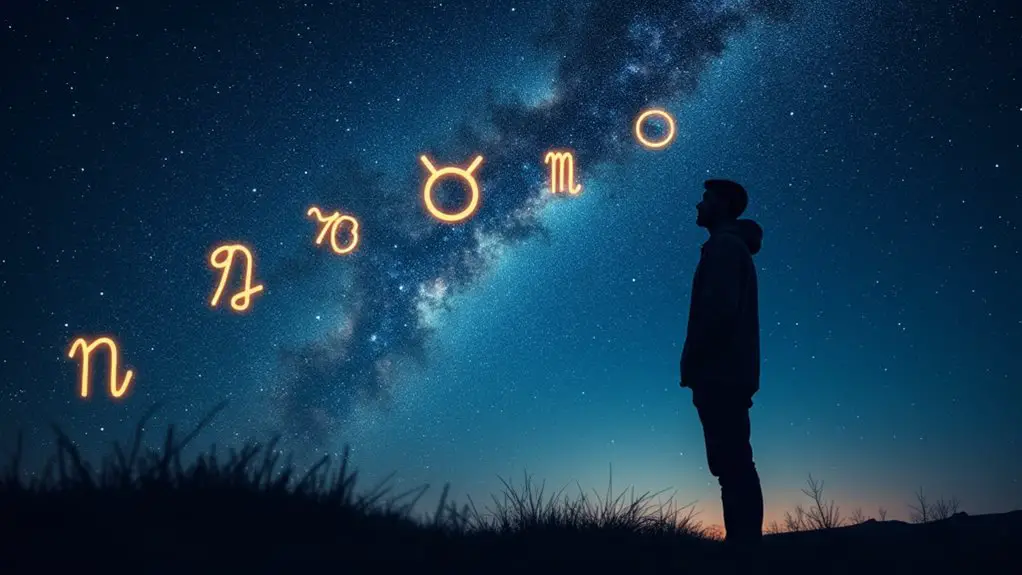Welcome, curious minds, to the cosmic realm of astrology and earth science! Prepare to embark on a journey that transcends the boundaries of time and space, as we delve into the age-old question: Is astrology earth science?
Like a celestial dance between the stars and the Earth, this inquiry requires us to navigate the realms of history, philosophy, and scientific scrutiny.
Imagine astrology as a radiant tapestry, woven with ancient wisdom and celestial threads. It embraces the intuitive and imaginative aspects of human existence, offering insights into our personalities, relationships, and life’s grand tapestry.
Earth science, on the other hand, is founded on the principles of observation, experimentation, and rigorous scientific methods. It seeks to unravel the mysteries of our planet, from the shifting tectonic plates to the majestic dance of weather patterns.
In this article, we shall explore the fascinating interplay between astrology and earth science. We will uncover their shared origins, examine the scientific validity of astrology, and ponder the cultural impact of both disciplines.
So, dear reader, prepare to expand your horizons and challenge your preconceptions. Join us on this cosmic quest, as we seek to unravel the enigmatic relationship between astrology and earth science.
Exploring the History of Astrology
Take a journey through time and uncover the captivating history of astrology, revealing its ancient origins and its profound impact on human civilization.
The history of astrology dates back thousands of years, with its roots deeply embedded in ancient civilizations such as the Mesopotamians, Egyptians, and Greeks. These early societies recognized the celestial bodies as powerful forces that influenced human behavior and the course of events on Earth.
Astrology’s cultural impact cannot be overstated, as it shaped the beliefs and practices of countless individuals and societies throughout history. It provided guidance and insight into personal relationships, career choices, and even political decisions. Astrology was not only a means of divination but also a way to understand the interconnectedness of all things in the universe.
Its rich history continues to fascinate and inspire us, reminding us of our enduring fascination with the cosmos.

The Foundations of Earth Science
Explore the fascinating realm of understanding our planet’s natural processes by delving into the foundations of this captivating field. Earth science is built upon foundational principles and scientific methods that allow us to comprehend the intricate workings of our planet.
Foundational principles:
- Uniformitarianism: The idea that the same natural processes that occur today have been shaping the Earth’s surface for millions of years.
- Plate tectonics: The theory that the Earth’s lithosphere is divided into large, moving plates that interact at their boundaries, causing earthquakes, volcanic activity, and the formation of mountains.
Scientific methods:
- Observation and data collection: Earth scientists meticulously observe and gather data about various aspects of the Earth, such as its atmosphere, hydrosphere, and geosphere.
- Hypothesis testing: Scientists develop hypotheses based on observations and test them through experiments and further observations.
By adhering to these foundational principles and employing scientific methods, earth scientists strive to uncover the mysteries of our planet and gain a deeper understanding of its past, present, and future.
Principles of Astrology
Immerse yourself in the mystical realm of celestial interpretation as you uncover the guiding principles that shape your cosmic destiny. Astrology is a fascinating field that seeks to understand the influence of the celestial bodies on human behavior and events.
Exploring astrological beliefs, you’ll discover that astrology is based on the principle that the positions and movements of the planets and stars at the time of your birth can reveal insights about your personality, relationships, and future. It’s a system that believes in the interconnectedness of all things and the notion that the universe is a vast web of energy.
However, it’s important to note that while astrology can provide personal guidance and self-reflection, scientific evidence doesn’t support the claim that it can predict specific events or outcomes. As you delve into the world of astrology, remember to approach it with an open mind and critical thinking, debunking astrological claims that may seem too good to be true.
Scientific Methods in Earth Sciences
Dive into the realm of scientific methods in the study of our planet and uncover the hidden truths that lie beneath the surface.
Earth sciences employ scientific experimentation and data analysis to unravel the mysteries of our planet. Through rigorous experiments and careful observation, scientists gather data to understand the Earth’s processes and phenomena.
They analyze this data using statistical methods and mathematical models to uncover patterns and make predictions about future events. Scientific methods in Earth sciences are grounded in objectivity and rely on evidence-based reasoning.
They involve hypothesis testing, where scientists propose explanations for observed phenomena and then conduct experiments to support or refute these hypotheses. Through this process, scientists gain a deeper understanding of the Earth and contribute to our knowledge of our planet’s past, present, and future.
Astrology’s Relationship with Astronomy
Unveiling the intricate connection between astrology and astronomy reveals the profound influence celestial movements have on our lives. Exploring astrology’s origins allows us to understand its historical significance and cultural impact.
The study of astrology dates back thousands of years, with ancient civilizations using celestial observations to make predictions and understand the world around them. However, it’s important to debunk astrology myths and acknowledge that astrology isn’t considered a science by the scientific community.
While astrology is based on the position of celestial bodies at the time of birth and their supposed influence on personality traits, it lacks empirical evidence and scientific rigor. Despite this, astrology remains a fascinating and popular subject, captivating many with its intuitive and imaginative interpretations of the cosmos.

The Role of Observation in Earth Sciences
Take a moment to observe the intricate patterns and formations in nature, as they provide valuable insights and understanding about the world around you.
Earth sciences rely heavily on observation and experimentation to uncover the secrets of our planet. By carefully analyzing data collected from various sources, scientists can piece together the puzzle of how the Earth functions and evolves.
The role of experimentation cannot be overstated in this process. Through carefully controlled experiments, scientists can isolate variables and test hypotheses, allowing them to draw meaningful conclusions about the Earth’s processes.
Equally important is the analysis of the data collected. By scrutinizing every detail, scientists can uncover patterns, trends, and anomalies that may hold the key to understanding complex Earth systems.
The importance of data analysis cannot be emphasized enough, as it is the foundation upon which scientific knowledge is built.
Astrology’s Predictive Nature
Immerse yourself in the captivating power of astrology’s predictions and let the stars guide your destiny.
Astrology, with its mystical allure, has long fascinated humanity. It taps into our innate desire for understanding and meaning in the universe. However, it is essential to recognize the limitations of astrology’s predictions.
While astrology can offer insights into our personalities and tendencies, it cannot predict specific events with absolute certainty. The cosmos may influence our lives, but our own actions and choices also play a significant role in shaping our future.
Astrology’s predictions should be approached with a sense of intuition, acknowledging that they are not set in stone. It is in this intuitive space that astrology can become a tool for self-reflection and personal growth, allowing us to navigate the complexities of life with greater understanding.
Earth Science and Empirical Evidence
Explore the vast realm of empirical evidence, allowing your senses to witness the wonders of the natural world and gain a deeper understanding of its intricate workings. Empirical evidence is the backbone of earth science, providing a solid foundation for understanding the physical processes that shape our planet.
When it comes to astrology’s validity, however, empirical evidence is noticeably absent. Here are four reasons why:
- Lack of reproducibility: Astrological predictions are often vague and open to interpretation, making it difficult to test their accuracy.
- Inconsistent results: Different astrologers may provide conflicting predictions for the same individual, undermining the reliability of astrology as a predictive tool.
- No scientific consensus: The scientific community has not reached a consensus on astrology’s validity, and many consider it a pseudoscience.
- Lack of causal mechanism: Astrology fails to provide a plausible explanation for how the positions of celestial bodies influence human behavior and events on Earth.
Without substantial empirical evidence, astrology remains outside the realm of earth science and lacks the credibility to be considered a legitimate scientific discipline.
Astrology’s Cultural Impact
Engage with the rich cultural impact of astrology, as its influence on various aspects of society can be seen in art, literature, and even personal beliefs.
Astrology has long been intertwined with human culture, shaping societal beliefs and practices. From ancient civilizations to modern times, astrology has played a significant role in shaping cultural significance and personal beliefs.
It has inspired countless works of art, from paintings to sculptures, that depict zodiac signs and celestial bodies. Astrological themes are also prevalent in literature, where characters’ personalities and destinies are often influenced by their astrological signs.
Moreover, astrology has influenced personal beliefs, as many individuals consult horoscopes and astrology charts to gain insight into their lives and make important decisions. Whether one believes in astrology or not, its cultural impact on society cannot be denied.
It continues to fascinate and captivate people, offering a unique lens through which to understand ourselves and the world around us.
Earth Science’s Contribution to Society
Earth science has made invaluable contributions to better understanding and addressing the world’s natural phenomena and their impact on our daily lives. Through its study of the Earth’s systems, earth science has played a crucial role in our understanding of climate change.
By examining the Earth’s atmosphere, oceans, and land, scientists have been able to identify the causes and effects of global warming, enabling us to take necessary steps to mitigate its impact.
Additionally, earth science has been instrumental in the prediction and preparation for natural disasters. By analyzing seismic activity, weather patterns, and geological formations, scientists can provide early warnings and evacuation plans, saving countless lives.
Earth science’s ability to decipher the Earth’s intricate processes has not only deepened our understanding of the natural world but has also allowed us to take proactive measures to protect ourselves and our planet.
Criticisms of Astrology’s Scientific Validity
Take a moment to consider the criticism surrounding astrology’s scientific validity and how it may challenge the beliefs you hold dear. Astrology has faced numerous criticisms regarding its scientific validity, and it’s important to examine these criticisms with an open mind.
Here are three key points to consider:
- Lack of empirical evidence: Critics argue that astrology lacks scientific evidence to support its claims. The predictions and explanations provided by astrologers are often based on subjective interpretations rather than empirical data.
- Lack of testability: Astrology’s predictions are often vague and open to interpretation, making it difficult to conduct controlled experiments to test its validity. This lack of testability raises doubts about astrology’s scientific basis.
- Confirmation bias: Critics suggest that astrology’s popularity may be due to confirmation bias, where individuals tend to focus on information that supports their pre-existing beliefs. This bias can lead to the perception that astrology is accurate, despite the lack of scientific evidence.
Considering these criticisms, it’s important to approach astrology with a critical mindset and question its scientific validity.
The Future of Astrology and Earth Science
Explore the potential convergence and mutual influence of celestial phenomena and scientific discoveries, igniting a sense of wonder and curiosity within you.
As we delve into the future of astrology and earth science, we’re compelled to contemplate the relevance of astrology in modern society. While some may dismiss astrology as mere pseudoscience, others recognize its potential for integration with earth science.
As our understanding of the cosmos expands, we may discover correlations between celestial events and earthly phenomena. Imagine a future where astrology, enriched by scientific research, offers insights into climate patterns, natural disasters, and even human behavior.
This potential integration could profoundly impact our understanding of the world, inviting us to view the universe as a dynamic and interconnected system.
So, let’s embrace the possibility and explore the uncharted territories where astrology and earth science may converge.
Frequently Asked Questions
Can astrology accurately predict future events?
Astrology’s accuracy in predicting future events is limited. While it can offer insights and possibilities, it cannot provide definite outcomes. Embrace its mystical nature, allowing it to guide your journey with wonder and curiosity.
What is the cultural significance of astrology?
Astrology holds deep cultural influence, its roots tracing back to ancient civilizations. It offers a glimpse into our collective imagination and provides a framework for understanding ourselves and the world around us.
How does astrology impact society?
Astrology has a profound impact on society, exerting social influence and triggering psychological effects. It shapes our beliefs, providing a sense of meaning and guidance. It taps into our intuitive nature, sparking curiosity and contemplation about our place in the universe.
What are the criticisms of astrology’s scientific validity?
Critiques of astrology’s scientific validity stem from the lack of empirical evidence supporting its claims. Skeptics argue that astrology fails to meet the criteria of a scientific discipline and lacks a solid foundation in rigorous scientific methodology.
What does the future hold for astrology and earth science?
The future holds exciting developments for astrology and earth science as these disciplines merge. Together, they will offer a deeper understanding of our world, bridging the gap between the physical and metaphysical realms.
Conclusion
As you reach the end of this exploration into the relationship between astrology and earth science, you can’t help but feel a sense of wonder about the mysteries of the universe.
While astrology may not fit within the framework of traditional earth science, it continues to captivate and inspire millions around the world. Its cultural impact cannot be denied, and its future remains uncertain.
Perhaps, in the vast expanse of time and space, there are still secrets waiting to be unveiled, and astrology may hold the key to unlocking them. Only time will tell.



